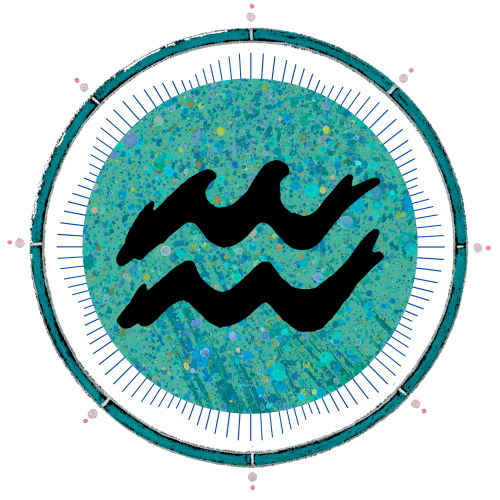And the little children cried as the waves swept o’er the side
It was sad when the great ship went down.
— American traditional
Dear Friend and Reader:
Evangeline Adams, the mother of modern American astrology, is said to have advised her client J. Pierpont Morgan, “Do not get on the Titanic.” Morgan, a man so wealthy he twice saved the United States from bankruptcy, depended on astrology, and she was his astrologer. Though there is no official recording of Adams’ statement, it’s a well-regarded bit of astrological lore. Looking at the chart for the ship departing Southampton, England at noon on April 10, 1912, it’s easy to see why she would have made that recommendation.
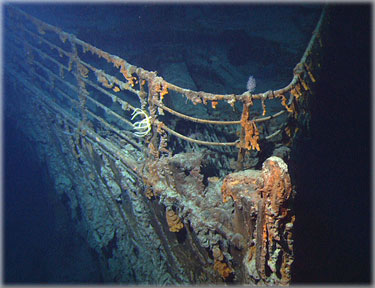
In its day, RMS Titanic was hailed as a marvel of technology — though this was largely a matter of show, or perception. Remember this was in a time when telephones and electric light were considered new and exciting. She was, however, the largest and most luxurious passenger ship of her day, designed with safety features that led informed people to believe she was unsinkable.
Titanic was never officially advertised as such, yet there was considerable word of mouth, and it was the presumption at the time. Edward J. Smith, Titanic’s captain, had said of another ship the year before, “I cannot imagine any condition which would cause a ship to founder. I cannot conceive of any vital disaster happening to this vessel. Modern shipbuilding has gone beyond that.”
In response to a female passenger’s apprehension during the boarding process the morning Titaniclaunched, a deck hand famously said, “Even God cannot sink this ship.”
Then on the morning of April 15, 1912, Philip Franklin, vice president of Titanic’s owner, White Star Line, was confronted by reporters and said, “We place absolute confidence in the Titanic. We believe that the boat is unsinkable.” By this time, the ship had already struck an iceberg and was at the bottom of the Atlantic, having taken 1,514 people with it. Talk about famous last words.
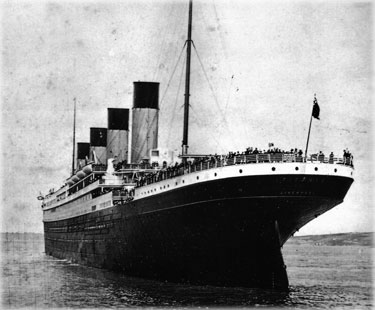
The statements by those involved with Titanic have a religious tone; they remind me of nuclear power advocates going on the offensive after the meltdowns at Fukushima. Despite a history of maritime disasters lasting as long as humans have been sailing, Titanic’s captain, though a beloved and well-respected commanding officer, did not think a modern vessel could sink. Imagine getting on a jetliner flown by a pilot who doesn’t believe that it’s possible to crash.
To study the Titanic incident is astonishing at every turn. For some reason it grabs hold of one’s attention and has a way of not letting go; we are still picking apart the details a century later.
Astrologers are no exception. Titanic sinking is one of the most studied charts in modern astrology. Let’s start with a basic reading of a different chart and see how it fits the circumstances — then go deeper, into the mystery of why Titanic is such a persistent topic. There is something deeper going on — including how it foreshadows so much of what happens in the 20th century, and perhaps describes something in the distant past.
What Evangeline Would Have Seen
Adams (much like any astrologer) would have checked the chart for the time the ship was scheduled to sail. She might have also used other techniques, such as checking her client’s natal chart for potential issues, but any astrologer faced with a question about a pre-scheduled voyage would work with the planned departure time. The time of the beginning of a journey tells you a lot about how things are likely to develop.
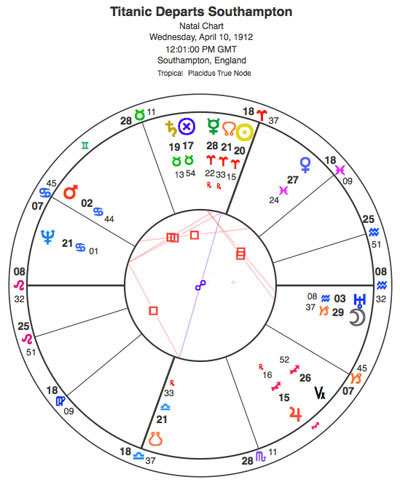
I’ve cast the astrology the way that Adams would have been looking at it: Neptune was the latest planet discovered (Pluto was still 18 years from discovery, though it still plays a major role in the chart for the ship sinking). Here is the chart with only the traditional points, the Part of Fortune, then Uranus and Neptune: a typical chart for 1912.
The Sun, the yellow circle at the top of the chart, represents glory and expression. It’s high in the sky, in the sign Aries, where it’s very strong (the word is exalted). This is the chart of not just a beginning but of a crowning achievement, and that elevated, blazing Sun in a fire sign describes this beautifully. The chart has Leo rising, making the Sun the ruler of that regal ascendant. This really should have been a moment of triumph. Note also that the Sun is in the 10th house, which represents high command, admiralty and corporate power.
Yet studying the chart for a moment longer, it’s easy to see that Neptune, the lord of the sea, and of disasters at sea, is making a lot of troublesome (and rather exact, which means strong) aspects. Remember that this is not merely the chart for a voyage — it’s a chart for the maiden voyage; a chart for the beginning of the ship’s career. These aspects to Neptune vividly describe the many, many cloudy judgments as well as the delusional thinking of those in charge.
It’s easy to find Neptune — that’s the blue trident on the left side of the figure. It’s in the sign Cancer — a water sign. Notice the number 21 next to it. Now look for three other points that have a 20 or 21 next to them — they are most of the problem. The Sun is square Neptune, which is a problem in the launching chart of a ship. A square aspect is a little like Neptune is drowning the fire of the Sun. This is also a condition of false beliefs: the word is delusion. Yet Neptune is in the 12th house, enhancing the Neptune effect and making it nearly impossible for anyone to discern the issues.
The thing to remember about Neptune is that like the power of the ocean that it represents, it’s often underestimated or overlooked. It has a way of disappearing, but that’s not possible in this chart because the aspects are so obvious. In this particular chart, the Sun-Neptune square is even more of a problem than it might ordinarily be, due to the Sun’s elevated position, its presence in a fire sign, and Leo in the ascendant. This means that the Sun has a lot of energy to trip up, which is exactly what Neptune does to it. This influence of Neptune will influence everything that the Sun represents, including the ship’s captain and his judgment.
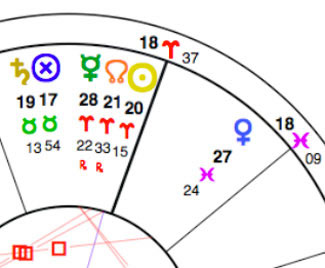
Last, the Sun is conjunct the North Node. That’s the orange horseshoe just to the left of the Sun. The North Node has a strong tug to it, a sense of urgency. The North Node is a ‘positive’ influence only if used consciously. Though this might not matter to some astrologers, the Sun is a few days short of being eclipsed (which happens as word of the disaster spread around the world). Think of the Aries Sun having all that fiery momentum — but it’s vexed by the watery power Neptune. Water always finds a way in.
For its part, Neptune is square the lunar nodes, which tells us that everything in the sequence of events depends upon being aware of whatever it represents. It should be an element in consciousness, though due to its house placement — the 12th — Neptune is even more veiled than usual, which is saying a lot. Survival depends on simple respect for natural forces, which calls for humility.
Two other elements of the chart might sound familiar: for one, Mercury was retrograde. That’s one of those things that messes with technology, with communications and with rational thought. Second, the Moon is void of course in Capricorn. The Moon void at the beginning of a trip says, “You have no idea where you’re going or how you’re going to get there.” The Moon is also coming out of a square to retrograde Mercury — these two factors are working against one another. Moon square Mercury describes a situation where intuition and mental reasoning conflict, which especially can be a problem with Mercury retrograde.
I would have looked at this chart and told my client: this is not going to end well. Stay off of that ship. And in fact, within minutes of leaving the port — literally minutes — the weight of Titaniccaused a massive water displacement in the harbor, and caused two other ships to snap their moorings. One of them, The City of New York, came within four feet of cracking into Titanic as she was pulling out of the port.
The Neptune Effect: ‘A Very Deceiving Night’
In the background of this whole story was operating one particular delusion: that Titanic was unsinkable. With Neptune square the Sun and nodes, much would hinge on that belief — and many other effects of Neptune.
A century later, persistent questions about the Titanic disaster include why she didn’t slow down or stop, despite warnings of ice, and why a nearby ship, Californian, did not come to her aid — despite seeing distress rockets. Speculating about the answers requires trying to enter the reasoning process of those making decisions, much of which is based on testimony from the British and American inquiries.
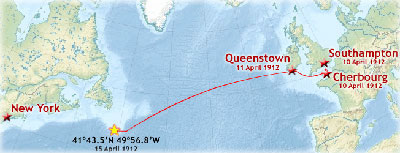
Yet facts about the natural environment offer some objective information that helps explain what the people involved in the incident might have been experiencing just before it happened. The night Titanicstruck an iceberg that was standing 80 feet above the ocean’s surface, the weather and climate conditions were extremely unusual, apparently one of a kind in recorded maritime history. An unusually large mass of clean, high pressure Arctic air had settled over the area, so the air was clear and cold and the ocean temperature was below the fresh water freezing point. The sky was lit only by stars, which were bright and twinkling. One survivor described the stars as seeming to talk to one another, deciding on the fate of the survivors.
Three months before the disaster, there was an unusual celestial alignment: the Moon was at a close apogee — its closest point to the Earth — and simultaneously, the Earth was at perihelion, its closest point to the Sun. The three bodies were in their closest proximity in 1,700 years, causing unusually high tides. This dislodged thousands of icebergs (created by an unusually warm Arctic summer the year before) that would typically have been stuck along the shores of Greenland and northern Canada. These ice masses, once set free, took three months or so to intersect with Titanic’s future path.
The night of the collision, the sea’s surface was extremely smooth, partly as a consequence of all the ice in the area — and there was a lot of it: many sizes of icebergs, and a vast sheet of field ice 75 miles long by three miles wide, floating on the surface of the Atlantic.
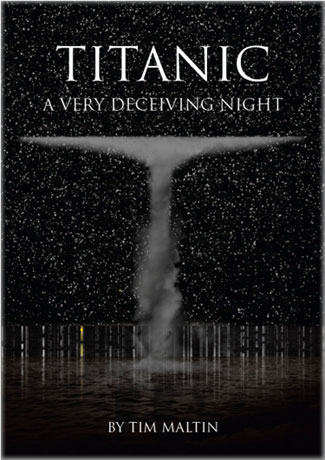
Tim Maltin, a British Titanic historian who has written three books on the subject, said in a Planet Waves interview Thursday that the atmospheric conditions conspired to create some strange effects — sensory distortions — that influenced everything from visual perception to reasoning processes. [Listen to the full interview here.]
In Maltin’s account of the weather that night, which took him more than six years to research from ships’ logs, testimony and other sources, we can see the manifestations of Neptune in the leading actors: issues of belief and faith, of visual illusion and psychological delusion.
Maltin’s newest book, published in 2010, is called Titanic: A Very Deceiving Night, a title evocative of Neptune. This book is a scientific account of atmospheric conditions that interprets the events of Titanic’svoyage in a new way. The book offers a proposed explanation for what happened that night.
Titanic had been warned many times that there was ice everywhere, but proceeded full steam ahead. Maltin proposes that Titanic’s command was not ignoring the warnings; rather, they believed they would see any ice in time to avoid it — hence based on prior experience, they did not slow down. Proper watch had been set. The bow of the ship was made absolutely dark, so that the light would not cause the watchmen’s pupils to constrict, giving them maximum night vision. The watches were being rotated every 20 minutes. So, besides the fact that they didn’t slow down on an icy sea, normal precautions were being taken by the crew.
One of the visual illusions that night involved a dramatic mirage effect. The frigid arctic air near the water, combined with the much warmer air higher up, caused distant objects to seem higher than they were. Due to such refraction of light, it’s possible to see over the horizon. When there are no objects to see, the horizon line itself seems to elevate. This effect is called ‘looming’. (The phrase ‘looming on the horizon’ means that something is visible and looks higher or closer than it is.)
In terms of the effect this had on the lookouts, the elevated horizon blurred the contrast between the iceberg and the sky; imagine the ocean seeming like it was sloped uphill, behind the iceberg. Contrast between the water and the ice is minimal at best. But the combination of the moonless night and the visual distortion on the horizon made it much more difficult.
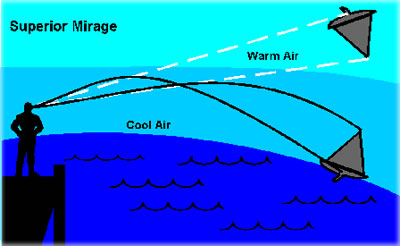
One of the lookouts, Frederick Fleet, later testified about a “slight haze” on the horizon before the Titanic struck the iceberg, which he discussed with a colleague, as did all of the lookouts who testified. Another lookout, Reginald Lee, described the iceberg as “a dark mass that came through that haze.” Maltin believes that had these conditions not existed, the lookouts would have seen the iceberg well in time.
Maltin says these conditions also explain, at least in part, the mystery of the closest ship to Titanic, called the Californian, which did not come to the aid of Titanic despite its officers seeing numerous distress rockets. Strangely, both ships were owned by the same company. Californianwas commanded by a young but highly decorated captain, Stanley Lord, whose conduct that night has been a persistent topic of controversy in understanding the Titanic disaster.
Californian was about 10 nautical miles from Titanic. But the looming effect made Titanic seem higher than it was. That, in turn, led Californian’s crew to believe that it was a smaller ship, but much closer. They knew that Titanic was the nearest ship, but due to the looming effect, what they saw didn’t look like it at all.
Lord, in his testimony at the inquiries, described that the nearby ship seemed as the size of a medium-size steamer rather than a giant passenger liner. “I am positive it was not the Titanic.” He added, “It was a very deceiving night.”
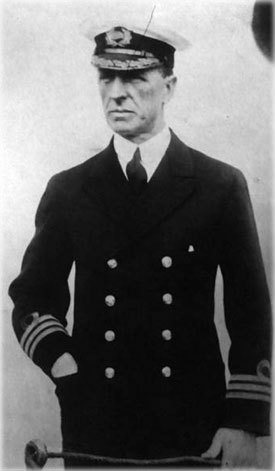
The looming effect also distorted the apparent height of the distress rockets. The refraction effect that causes looming only occurs low on the horizon. The rockets were exploding in warmer, normally refracting air — higher up, while Titanic was looming in the cold air at sea level. “These rockets did not appear to go very high. They were only about half the height of the steamer’s masthead light,” according to the testimony of Californian’s second officer, Herbert Stone.
“Captain Lord should have gone to Titanic’s aid. But if it hadn’t been for the abnormal atmospheric conditions, he would have gone,” Maltin says. “Had he recognized that it was the Titanic, he would have radioed to her.” Maltin reconstructs events this way: the only other ship in the area with a radio was Titanic, “but his brain told him it wasn’t the Titanic. His brain was correct to deduce that it wasn’t the Titanic. He made a rational decision that in hindsight was very, very bad.”
Maltin believes fear played a role: Lord was afraid to move his ship, even to rescue another vessel, which he tried to contact with a Morse signal lamp. “Lord believed this other vessel was only four or five miles away, she should have replied to the Morse lamp. But the nearby ship didn’t reply, leading him to believe that she was not in trouble.”
This is a lovely description of the Neptune effect: visual distortions, haze on the water, seeing something as something else, denial, danger coming through the haze as a dark mass, a sense of deception pervading everything — and this was influencing the catastrophic decisions that Lord made. We could add to that his denial that there was a problem, despite his having considerable evidence of one — mainly in the form of seeing Titanic’s distress rockets and his knowledge of the dangerous conditions.
Neptune can feel like a drug that you don’t know that you took, and therefore you don’t know you’re under its influence. Yet when you actually notice, in the moment or in hindsight, you wonder why you didn’t act. The precautions Titanic’s captain took seemed reasonable; the ones he failed to take seemed strange only in hindsight. That is Neptune: it works within a world and a logic of its own, and there is always a lot to be said after the fact.
Mercury Retrograde and a Void Moon
Mercury was retrograde when Titanic set sail, and through her entire short-lived career. As anyone who follows astrology knows, Mercury retrogrades are famous for miscommunication, crossed signals and misunderstandings.
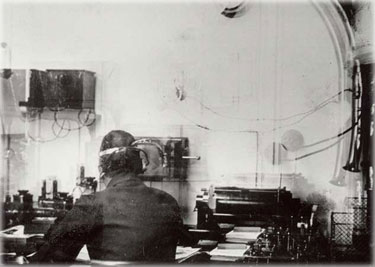
The void of course Moon, meanwhile, is famous for hapless behavior and as the name implies, for lack of direction. In the departure chart it’s in Capricorn — the sign of management and command. Remember that these two factors exist under the simultaneous influence of Neptune.
Despite repeated warnings about ice, inquiry testimony reveals that Titanic’s officers never conferred and made a conscious decision what to do. Titanic plunges ahead through the ice-strewn sea at top speed.
Just 10 nautical miles away, the captain of the nearby Californian was so concerned that he ordered his ship to stand still for the night. Earlier that night, Californian had run into the edge of an ice field — a broad, thin sheet of ice that didn’t harm the vessel but which shook up Captain Lord. Californian’s crew knew Titanic was in the area, and Lord instructed his radio operator to inform Titanic that Californian was stopped, surrounded by ice.
Enter a series of spectacular Mercury retrograde communication failures. According to testimony at the inquiry, Titanic’s on-duty wireless operator, Jack Philips, was busy working off a substantial backlog of personal messages with the wireless station at Cape Race, Newfoundland — a distant station with a quiet signal. When Californian sent its final ice warning, it cut loudly into Titanic’sstream of Morse code. Philips rebuked Californian’s operator with a snarky Morse signal that translated to: “Shut up, shut up, I’m working Cape Race.” Californian’s wireless operator listened for a little while longer, turned off the wireless and went to bed. Ten minutes later, Titanic struck the iceberg, sending out her first distress call 25 minutes later.
One communication failure in that last transaction was that Californian’s operator didn’t put a special code in front of her message called an MSG code, which designates that the communication is for the captain. This lack of protocol led Titanic to believe that it was a casual communication, and she replied casually, saying she was busy.

As Titanic sank, she sent up a series of distress rockets — but in response, Californian didn’t turn back on her radio. Maltin explains the reasoning behind this decision: Captain Lord didn’t think the ship he saw, which appeared much smaller than Titanic and therefore could not be Titanic, had a radio. What point was there sending a message? So instead, Californian sent light signals in Morse code. Yet the fluctuations in the density of the air between the two vessels visually scrambled the Morse lamp signal. Titanic didn’t reply.
The next morning, the Californian’s officers saw a ship on the horizon. They turned on their radio to inquire what had happened to the ship that had fired off a series of distress rockets earlier that morning. It turned out to be a ship rescuing survivors.
When Californian’s officers testified in the inquiry, they argued that they thought the rockets may have been ordinary company communication and not signs of distress. But all seamen know that a series of rockets fired from a ship indicates an emergency, so this was a thin denial. Californian’s officers also claimed that they were stopped and could not use their radio. Yet Californian was under steam the whole night in case the vessel had to be moved out of the way of ice, as well as for heat and electric power.
So we see the Neptune effect at its worst: distorted perception, prejudiced by belief, aided and abetted by denial. With Neptune there can be the failure to investigate the obvious; the failure to heed a warning. Top among these distortions was the notion that Titanic could not sink. Had her captain, or anyone, believed that she could, perhaps the spell would have worn off. Yet with Neptune, proof is often of little use.
“This was a tragic event that was not caused by stupid human errors. It was caused by the universe,” Maltin said, adding: “It was a natural event, caused by nature, a perfect storm of atmospheric conditions, not avoidable human errors.”
The Atlantis Factor
The mythology of Atlantis, the lost continent, is about humanity’s hubris handling its own technology. Myths and parables relate themes, and the theme of the Atlantis parable — the lost continent — is a story about ethics as they are applied to the advances of our civilization.
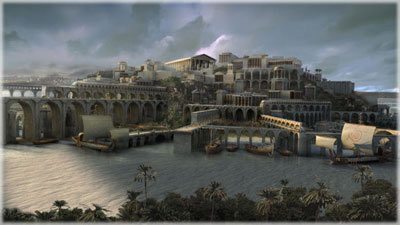
On the day that Titanic sailed, humans had been sailing the seas and sending signals to one another for a long time. Yet the people, and the companies, involved in this endeavor could handle neither their vessels, nor their communication devices, nor their better judgment. Many conscious choices were made that contributed to what happened. We could analyze them one at a time, or we could look to the philosophy that facilitated the confluence of events. In this article, I’ve only told a thimbleful of the Titanicstory; there was was also the lack of lifeboats, the underutilized lifeboats, and who got to board them. No drills had been conducted, even for the crew. Third-class passengers were locked below decks and could not get out. Most of the children in the third-class area drowned, as did their parents. See the data here. The list of atrocities goes on.
In many ways the Titanic disaster forebodes the history of the 20th century that is to follow: a study in the precautionary principle. Faced with a potential problem or danger, how do you respond? For example, if you’re a chemical company and you find out your pesticide might make people sick, what do you do? Leave it on the market? Or take it off the market? The precautionary principle says you err on the side of the least harm.
The precautionary principle used to be called the worst-case analysis: considering the possibility of an extremely low-probability event that could have an extremely high impact. That went out the window with the 20th century and its many inventions (particularly all things nuclear, banks too big to fail and ‘food’ becoming a synthetic chemical brew), and was replaced by risk analysis. Risk analysis or risk assessment is based on assumptions, which can always be made up, minimized, manipulated, ignored or redefined. Today we think that there’s no need to consider the worst-case scenario if it probably won’t happen — which is why it happens so often now.
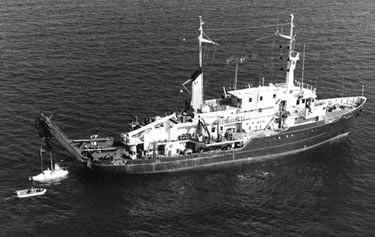
Humans are blindsided by their own cleverness and blinded by their beliefs. But humans also tend to love their circular reasoning processes: we didn’t need to test for contamination because there wasn’t any. Therefore, the place is safe — don’t worry. It’s one thing for a corrupt health official to make that statement; it’s another for nearly everyone to risk it willingly. Some would call this hubris; some would call it attempted murder or murder; you could call it suicide.
To learn about the spiritual crisis at the heart of this, we don’t need to look for the lost continent of Atlantis, or figure out what happened there; we merely need to look at these thought processes for what they are. The myth and the idea of Atlantis, the continent that sank because it lacked the ethics to handle its own technology, are alive in all of them. We know this is a story about us, that we’re watching as it happens. We don’t know ‘how it will end’, but then we’re not doing much to change the ending. When we experience a Titanic or a Fukushima, a mirror is held up to our consciousness.
For about 10 years I’ve been noticing a pattern in the astrology charts of world disasters. Many of the biggest ones have one particular degree of the zodiac occupied. I first noticed this when the position of the Moon in the chart for the massive Banda Aceh quake and tsunami that killed 240,000 people in 2004 was the same position, to one-quarter of a degree, as the Moon in the chart for the Sept. 11 attacks — something that would seem to be impossible. The degree position is 28+ Gemini.
The next time I noted that degree in a world horoscope, it was in the chart of WikiLeaks — as the exact degree rising. WikiLeaks is devoted to exposing the prevailing denial of our culture. Then that degree appeared again in several charts for the Fukushima disaster. I’ve seen a lot of weird synchronicities doing astrology but this one was quickly going to the top of the list. By this time I had started calling it the Atlantis degree, which I covered in an article last March called Here at the Edge of the World. To make the point that splitting the atom was (and is) courting Atlantis, we illustrated the article with archival photos from the history of nuclear war and atomic energy.

One idea that this article points to is how the environment itself is being used as a weapon of war. It took me a while to figure that out, and I felt like I was going out on a limb saying so. Yet the night I published the article I got an astonished email from someone whose work many of our readers would recognize, who told me about a dream she had weeks before Fukushima that warned her that a nuclear power station was about to be hit by a kind of weapon beam and blown up.
I haven’t done much with the Titaniccharts till now. When I cast the one that I’ve used for this article, the departure chart, one of the first places I looked was 28+ Gemini to see what was there, in that very degree. I could barely believe what I was looking at: the asteroid Atlantis. In astrological delineation, Atlantis is associated with sea disasters, the fear of drowning and events at the end of an age. Martha Lang-Wescott describes it as representing “the feeling that others know something you don’t, know more about it or you than you do, are keeping secrets, and can betray one’s trust.”
Now, magnify these issues onto an industrial scale; imagine the damning corporate documents that reveal how much companies know about how much can go wrong, but don’t tell you.
Atlantis connections abound with Titanic. The wreck was discovered while a scientist named Bob Ballard was searching for two sunken nuclear submarines, as a special operative for the Navy. He returned to Titanic’s resting place and explored the debris field from aboard a ship called Atlantis II.
There are several accounts, including that of Edgar Cayce, which put the location of the wreck as just off the northwest coast of where Atlantis might have been, and where it exists mythically in the minds of many people, which chills them a bit. And Titanic herself, that self-contained world, has the feeling of a civilization that sank to the bottom of the Atlantic Ocean with nearly all her inhabitants, merely because her masters believed they were infallible.
Lovingly,
![]()
As Titanic Sinks, Moon Aspects Undiscovered Pluto and Eris
In the article above, we got a look at the chart for Titanic’s departure from Southampton, England. The more frequently studied chart is that of the vessel sinking, widely reported as 2:20 am. Now that the wreck has been found, it’s possible to have an exact chart. There is a lot we can say about this horoscope, but I want to focus on one feature: the Pluto-Eris square, and how prominent it is in the chart.
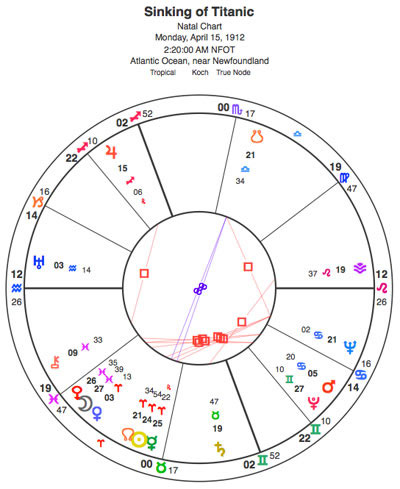
Neither of these planets had been discovered at the time — so this chart is a study in how planets can have effects before anyone has ever known of their existence. In this chart, it’s two undiscovered planets that are in an aspect at the time of the incident: Pluto (discovered in 1930) is making a long square to Eris (discovered in 2005). The square aspect between these slow-moving points stretches from 1906 to 1911, though there is a close near miss on the night of April 13, 1912 — the day before Titanic struck the iceberg. You can review the list of events here to see for yourself.
When you consider that these planets have orbits of 251 years (in the case of Pluto) and 557 years (for Eris) that’s a suggestion that the aspect is influential in this event — and of what it portends. Not only does the aspect between the two slow-movers emphasize their presence: the fast-moving Moon is right in the mix. It is conjunct Eris, and square Pluto.
First let’s look at the Moon square Pluto, which has been interpreted by many astrologers. The Moon is in Pisces; this is an image of a vessel on water. That vessel is in an exact square to a big hunk of ice that nobody could see — Pluto, which is also an agent of death. What is interesting is that the Moon is in the same degree that Venus was occupying when the ship left the port; in that chart, Venus is square Pluto. In both charts, they indicate the profound loss of life that will come out of this event.
As for Moon conjunct Eris: that aspect had just happened; it is separating, and it was exact throughout the disaster sequence. This was the next aspect at the time the ship struck the iceberg. Eris, too, is an icy, distant and invisible planet. In mythology she is associated with warfare and disaster; in astrology I associate her with a kind of mental identity chaos, a mark of the postmodern age. Titanic was supposed to be a modern vessel, but in truth a modern ship would have had proper safety features, such as sufficient lifeboats. Postmodern is when those things decay.
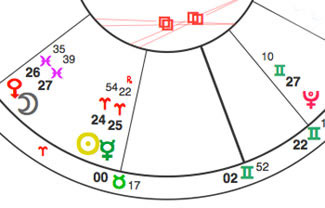
Let’s look at a few more features of this chart. In any death chart, it’s essential to check the 8th house — the nature and cause of death. We find Virgo on the cusp, and Libra intercepted. That means the house has two rulers. Virgo is ruled by Mercury — and retrograde-Mercury communication failures were an undeniable cause of this whole incident. Note that Mercury is retrograde and is about to conjunct the Sun, who represents the officers of the vessel. They are having a full-on encounter with Mercury retrograde.
As for Venus: she is square Uranus. All of this comes as a ‘surprise’ that should not really be a surprise. Events come out of nowhere and proceed very quickly, in true Uranian style. Venus is also a planet of money and value; the 8th covers those topics as well (through themes like inheritance). Who invested money, and who lost and who gained from this incident, would make an interesting topic for a book. Venus square Uranus describes a kind of expedience and corner-cutting where it counts the most. And Uranus is about technology. We have a human factor (Venus) colliding with a technological one (Uranus). Venus also rules the South Node, which is in Libra; she is a visitor from the distant past.
Titanic sinks right before an eclipse of the Sun. Remember how powerful the Sun was in the chart for Titanic’s departure? That Sun is about to be eclipsed by the Moon, in Aries, a sign where the Sun should be supreme. Think of this as an extinguishing of the light, both for Titanic herself and all that she represented.
Eclipses have a potent resonance effect, often timed with something that the whole world can feel. That eclipse happened as news of the disaster spread, with all of its shock and outrage.

Friday, April 13, 2012. Weekly Horoscope #899 | Eric’s Zodiac Sign Descriptions
With the Sun conjunct both Eris and Vesta, you may be feeling some unusual pressure to figure out who you are. You’ve been doing this for a while, though the chaos factor may be reaching a new peak. I suggest you see this as a positive development: your psyche is trying to free you from your ideas of who you were in the past. I don’t even mean the reality of who you were — I mean your concept of who you were, which is a kind of story. As soon as you see that story as such, you will have the most significant tool to liberate yourself from it. As Mars stations direct on Friday, you will be reminded that healing is indeed finding freedom from the past. Mars has been retrograde now for 11 weeks, dragging you through many layers of your inner being, and your fears, and the harsh way you sometimes treat yourself. This has been quite an odyssey, and you’re about to be released all at once, and sprung forward into new adventures.
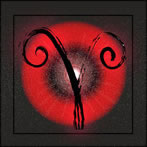 Aries (March 20-April 19) — You are correct in that the ultimate cure, solution resolve, is spiritual. There’s only so much we can manipulate the physical world, or even our thoughts. True healing occurs on a deeper level. What you may be feeling, though, is how far away that place of healing seems — as if somehow it’s a world apart. Even if it is, you can still get there. It will help if you not concern yourself with whether you believe it’s true or possible; this is a matter of setting your intentions, and having faith in yourself. It’s clear from your charts that you’ve made great efforts to cross what may not, in retrospect, seem like such a great distance. Yet we’re talking about inner space, where the sense of scale is different than external space. What you’ve succeeded in doing is shifting your attention to an introspective direction. You have dared to inquire about something that you might have otherwise overlooked. That required an act of faith in yourself — faith that you still possess.
Aries (March 20-April 19) — You are correct in that the ultimate cure, solution resolve, is spiritual. There’s only so much we can manipulate the physical world, or even our thoughts. True healing occurs on a deeper level. What you may be feeling, though, is how far away that place of healing seems — as if somehow it’s a world apart. Even if it is, you can still get there. It will help if you not concern yourself with whether you believe it’s true or possible; this is a matter of setting your intentions, and having faith in yourself. It’s clear from your charts that you’ve made great efforts to cross what may not, in retrospect, seem like such a great distance. Yet we’re talking about inner space, where the sense of scale is different than external space. What you’ve succeeded in doing is shifting your attention to an introspective direction. You have dared to inquire about something that you might have otherwise overlooked. That required an act of faith in yourself — faith that you still possess.
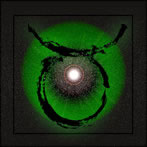 Taurus (April 19-May 20) — Not everyone is blessed with curiosity about themselves. Though some people are, that curiosity is often fragile and can be thwarted by everything from external distractions to the fear of what one might discover inwardly to an odd kind of shame about getting to know oneself as a conscious act. For the past few months, it’s as if you’ve been dragged inward, and have felt compelled to explore territory that you might have avoided otherwise. Yet as you’ve moved through these regions in yourself, you’ve noticed all the things you want that exist there. You’ve also come within sight of a truly significant personal goal, this despite some protest along the way. And you’ve opened up inner territory that until now was truly unfamiliar. Remember, as you enter a new phase of experience, how challenging it was, and what you had to go through to learn what you did. Never take that for granted; what was strange to you yesterday or two months ago still deserves to be treated with the respect for the unknown — and that starts with curiosity.
Taurus (April 19-May 20) — Not everyone is blessed with curiosity about themselves. Though some people are, that curiosity is often fragile and can be thwarted by everything from external distractions to the fear of what one might discover inwardly to an odd kind of shame about getting to know oneself as a conscious act. For the past few months, it’s as if you’ve been dragged inward, and have felt compelled to explore territory that you might have avoided otherwise. Yet as you’ve moved through these regions in yourself, you’ve noticed all the things you want that exist there. You’ve also come within sight of a truly significant personal goal, this despite some protest along the way. And you’ve opened up inner territory that until now was truly unfamiliar. Remember, as you enter a new phase of experience, how challenging it was, and what you had to go through to learn what you did. Never take that for granted; what was strange to you yesterday or two months ago still deserves to be treated with the respect for the unknown — and that starts with curiosity.
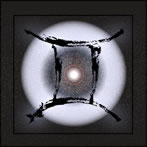 Gemini (May 20-June 21) — I’m looking at your chart thinking: this has to be an interesting time for sex, or at least your ideas about sex, and discovering what you want. That’s something you’re fortunate to have available, and I suggest you use it to your maximum advantage. Yes, there is an uncomfortable edge, as if you’re having to stretch in a direction you’re not totally sure about: in particular, how it feels to respond to the erotic power of someone else. There may be an element of simultaneous attraction-repulsion. If you’re experiencing that, look no further than yourself for understanding. Your responses are all about you, no matter who else may be involved. Any sensation of approach-avoid can indicate the presence of hidden guilt. You may be worried about what ‘someone else’ would think if they knew what you wanted, or were experiencing with such pleasure. Go past that and see what’s on the other side.
Gemini (May 20-June 21) — I’m looking at your chart thinking: this has to be an interesting time for sex, or at least your ideas about sex, and discovering what you want. That’s something you’re fortunate to have available, and I suggest you use it to your maximum advantage. Yes, there is an uncomfortable edge, as if you’re having to stretch in a direction you’re not totally sure about: in particular, how it feels to respond to the erotic power of someone else. There may be an element of simultaneous attraction-repulsion. If you’re experiencing that, look no further than yourself for understanding. Your responses are all about you, no matter who else may be involved. Any sensation of approach-avoid can indicate the presence of hidden guilt. You may be worried about what ‘someone else’ would think if they knew what you wanted, or were experiencing with such pleasure. Go past that and see what’s on the other side.
 Cancer (June 21-July 22) — There’s no crisis — only a minor disturbance, and from that, you can learn a lot about how to use a challenge to create an invention. You seem to be working out some kind of mental puzzle — maybe several of them — which all point back to one basic idea: how you think. It’s special for an entity to be aware of its own awareness. It’s a kind of reflexiveness that distinguishes certain kinds of individuals, in particular, the ones capable of conscious change, because they are capable of being self-aware. An untrained mind is cumbersome. You are starting to learn some mental discipline, and you may have discovered that mostly means guiding rather than pushing yourself. As one born under such an intensely emotional sign, a significant element of discipline is the ability to detach a little, and not be carried so far, so fast, by your stream of feelings. Yet all of this is secondary to one truly useful discovery you’re about to make about yourself.
Cancer (June 21-July 22) — There’s no crisis — only a minor disturbance, and from that, you can learn a lot about how to use a challenge to create an invention. You seem to be working out some kind of mental puzzle — maybe several of them — which all point back to one basic idea: how you think. It’s special for an entity to be aware of its own awareness. It’s a kind of reflexiveness that distinguishes certain kinds of individuals, in particular, the ones capable of conscious change, because they are capable of being self-aware. An untrained mind is cumbersome. You are starting to learn some mental discipline, and you may have discovered that mostly means guiding rather than pushing yourself. As one born under such an intensely emotional sign, a significant element of discipline is the ability to detach a little, and not be carried so far, so fast, by your stream of feelings. Yet all of this is secondary to one truly useful discovery you’re about to make about yourself.
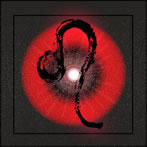 Leo (July 22-Aug. 23) — The Sun opposing Saturn looks like you’re going through a test of your ethics. This comes on top of a long, careful quest to determine your true values; to figure out what’s actually important to you. The two are related. It’s one thing to figure something out in theory, and another when the time comes that you have to put your idea to work in a real-time situation. The scenario looks like you must make difficult decisions, having been confronted by a limit of some kind, be it your time, your energy or some external factor. Before you spend too much time figuring out what to do about that, I suggest you check for where you have additional resources that you hadn’t thought to apply to the situation. Most of the time (contrary to the messages of advertising) when you need something, you already have it. In this situation, though, that ‘thing’ isn’t a thing — it’s an approach to the question; you might think of it as applied science, as opposed to theoretical.
Leo (July 22-Aug. 23) — The Sun opposing Saturn looks like you’re going through a test of your ethics. This comes on top of a long, careful quest to determine your true values; to figure out what’s actually important to you. The two are related. It’s one thing to figure something out in theory, and another when the time comes that you have to put your idea to work in a real-time situation. The scenario looks like you must make difficult decisions, having been confronted by a limit of some kind, be it your time, your energy or some external factor. Before you spend too much time figuring out what to do about that, I suggest you check for where you have additional resources that you hadn’t thought to apply to the situation. Most of the time (contrary to the messages of advertising) when you need something, you already have it. In this situation, though, that ‘thing’ isn’t a thing — it’s an approach to the question; you might think of it as applied science, as opposed to theoretical.
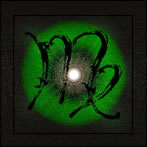 Virgo (Aug. 23-Sep. 22) — Mars has been retrograde in your sign since January, which may have run you out to the end of your tether. Overnight Friday to Saturday, Mars changes to direct motion, and you get your answer to the question, ‘what gives?’ Yet unlike our typical (Western world) response of leaving problems mostly solved or being satisfied with questions that are mostly answered (or worse, accepting an answer that just sounds good), this is your opportunity to work through this particular personal material thoroughly. This weekend brings a significant turning point; make sure you’re moving slowly and consciously enough to feel it. Yet between now and early July is a time for you to make sure you tidy up, summarize and most of all put what you’ve learned into practice. Yes, give it that long. This does not allow a lot of time for delays — you have, in fact, exactly enough time to consolidate your accomplishments and move on to something extraordinarily productive.
Virgo (Aug. 23-Sep. 22) — Mars has been retrograde in your sign since January, which may have run you out to the end of your tether. Overnight Friday to Saturday, Mars changes to direct motion, and you get your answer to the question, ‘what gives?’ Yet unlike our typical (Western world) response of leaving problems mostly solved or being satisfied with questions that are mostly answered (or worse, accepting an answer that just sounds good), this is your opportunity to work through this particular personal material thoroughly. This weekend brings a significant turning point; make sure you’re moving slowly and consciously enough to feel it. Yet between now and early July is a time for you to make sure you tidy up, summarize and most of all put what you’ve learned into practice. Yes, give it that long. This does not allow a lot of time for delays — you have, in fact, exactly enough time to consolidate your accomplishments and move on to something extraordinarily productive.
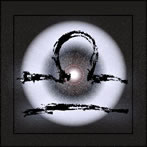 Libra (Sep. 22-Oct. 23) — Do your beliefs help you feel any safer on the planet? You can test your theory by getting clear what you believe, where there is no evidence to support that belief. I know this is asking for a lot of self-reflection, and for intense honesty of a kind that’s pretty rare. Whether you feel safe is the question right now, which includes within the private confines of your mind, with the way you relate to someone close to you, and how you feel within your physical environment. You’re more likely to notice an unsupported belief by accident. For example, you encounter an ‘issue’ and you figure out that a series of assumptions got you there. Or you discover that you really were being dragged around by a religious value that you hadn’t identified as such previously. Or you find yourself acting in a way similar to much older relatives who you know are disconnected from reality. It’s easy to forget these discoveries when we make them. I’m suggesting you notice them, and remember them, and then go on a hunt for both their origins and their effects on your life. If the term ‘being your own person’ has any meaning at all, examining these themes would be included in its meaning.
Libra (Sep. 22-Oct. 23) — Do your beliefs help you feel any safer on the planet? You can test your theory by getting clear what you believe, where there is no evidence to support that belief. I know this is asking for a lot of self-reflection, and for intense honesty of a kind that’s pretty rare. Whether you feel safe is the question right now, which includes within the private confines of your mind, with the way you relate to someone close to you, and how you feel within your physical environment. You’re more likely to notice an unsupported belief by accident. For example, you encounter an ‘issue’ and you figure out that a series of assumptions got you there. Or you discover that you really were being dragged around by a religious value that you hadn’t identified as such previously. Or you find yourself acting in a way similar to much older relatives who you know are disconnected from reality. It’s easy to forget these discoveries when we make them. I’m suggesting you notice them, and remember them, and then go on a hunt for both their origins and their effects on your life. If the term ‘being your own person’ has any meaning at all, examining these themes would be included in its meaning.
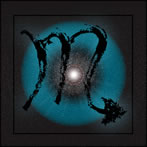 Scorpio (Oct. 23-Nov. 22) — Expect people to treat you differently. That’s to say — you can release them from their past opinions of you, which is a burden that both they and you carry. The nature of the burden is that when people are locked into their old ideas of who a person is, that leaves no room for who they are in the present moment. We all know how much people seem to walk around with their minds made up about everything and everyone. You have the power, at least, to create a liberated zone where this is possible. Inside that space, you will notice that you have the freedom to set some new goals for yourself, and to admit some new desires, ones that in the past you feared might have conflicted with what others thought your life was supposed to be about. This is the liberation you need the most: to be able to define your purpose, irrespective of what all those people in the past might have thought, and shorn of any perceptions of others of who you’re supposed to be today. This may feel daring, but it’s not as dangerous as you think.
Scorpio (Oct. 23-Nov. 22) — Expect people to treat you differently. That’s to say — you can release them from their past opinions of you, which is a burden that both they and you carry. The nature of the burden is that when people are locked into their old ideas of who a person is, that leaves no room for who they are in the present moment. We all know how much people seem to walk around with their minds made up about everything and everyone. You have the power, at least, to create a liberated zone where this is possible. Inside that space, you will notice that you have the freedom to set some new goals for yourself, and to admit some new desires, ones that in the past you feared might have conflicted with what others thought your life was supposed to be about. This is the liberation you need the most: to be able to define your purpose, irrespective of what all those people in the past might have thought, and shorn of any perceptions of others of who you’re supposed to be today. This may feel daring, but it’s not as dangerous as you think.
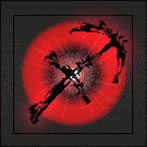 Sagittarius (Nov. 22-Dec. 22) — Progress in one’s career is rarely a rapid process. True, some of the most visible careers are the ones that go off like meteors: for example, those of young celebrities, many of whom seem to have done little to deserve the kind of money and adulation that’s poured all over them. This can be frustrating for those whose success is incremental, or is in fields that are considered less marketable than fast food or smartphones. You’re not letting that stop you, however. What you’re doing has inherent value — both to you and to the world around you. If the cash-in-instantly factor is not there, something else is, which is the feeling of integrity. It’s essential that you view your ‘small’ successes as successes. Note when your direction of travel shifts in the direction of what you want. Remember that persistence over the long haul is more effective than one or two big achievements. Yet despite all of this, when you are recognized for something, it’s crucial that you be gracious about that, and pause for a moment and reflect on what you did, how you did it and why anyone actually cares.
Sagittarius (Nov. 22-Dec. 22) — Progress in one’s career is rarely a rapid process. True, some of the most visible careers are the ones that go off like meteors: for example, those of young celebrities, many of whom seem to have done little to deserve the kind of money and adulation that’s poured all over them. This can be frustrating for those whose success is incremental, or is in fields that are considered less marketable than fast food or smartphones. You’re not letting that stop you, however. What you’re doing has inherent value — both to you and to the world around you. If the cash-in-instantly factor is not there, something else is, which is the feeling of integrity. It’s essential that you view your ‘small’ successes as successes. Note when your direction of travel shifts in the direction of what you want. Remember that persistence over the long haul is more effective than one or two big achievements. Yet despite all of this, when you are recognized for something, it’s crucial that you be gracious about that, and pause for a moment and reflect on what you did, how you did it and why anyone actually cares.
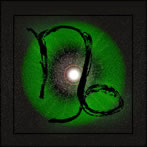 Capricorn (Dec. 22-Jan. 20) — The Sun opposed to your home planet Saturn this weekend is a reminder that true strength comes from within. Authentic motivation is something you carry in your body, not something that you get from your environment. Yet if there is one environmental factor, it’s a sense of grounding in your personal space. You need a measure of emotional stability in your life, no matter how challenging that may be to create. Notice all of the factors around you that are designed to knock you off balance, which in turn creates the need for things you don’t really need. These influences range from advertising to religion, which are basically the exact same social force. When you feel complete in yourself, you feel capable of anything. This is not a mirage — it’s actually true. I suggest you take time this weekend to cultivate that sense of grounding. Go where you feel the most sane and secure. Take some time and make a simple improvement to your living space. Pause and actually get enough rest — and then notice what happens to your anxiety level.
Capricorn (Dec. 22-Jan. 20) — The Sun opposed to your home planet Saturn this weekend is a reminder that true strength comes from within. Authentic motivation is something you carry in your body, not something that you get from your environment. Yet if there is one environmental factor, it’s a sense of grounding in your personal space. You need a measure of emotional stability in your life, no matter how challenging that may be to create. Notice all of the factors around you that are designed to knock you off balance, which in turn creates the need for things you don’t really need. These influences range from advertising to religion, which are basically the exact same social force. When you feel complete in yourself, you feel capable of anything. This is not a mirage — it’s actually true. I suggest you take time this weekend to cultivate that sense of grounding. Go where you feel the most sane and secure. Take some time and make a simple improvement to your living space. Pause and actually get enough rest — and then notice what happens to your anxiety level.
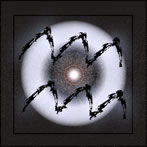 Aquarius (Jan. 20-Feb. 19) — Your mind has been a kaleidoscope lately, though if you’re trying to finish a project of some kind, this weekend will be a good time to do that. In particular, if you’ve been trying to write something, pull together a web project, organize your workspace or focus a business project, this is the time. One thing that will come in handy in the coming weeks is an updated resume or CV. I suggest you get that going, even if you don’t finish the work (those things take some time). Several factors that have been presenting a challenge to your mental focus are now out of the way, and other factors will offer the sense of having all of your wheels touching solid earth. Use these opportunities well. When the Sun changes signs into Taurus in less than a week, your professional goals and position in the business community will come into focus — and I suggest you be prepared well in advance. There’s an old expression I love: luck is where preparation meets opportunity.
Aquarius (Jan. 20-Feb. 19) — Your mind has been a kaleidoscope lately, though if you’re trying to finish a project of some kind, this weekend will be a good time to do that. In particular, if you’ve been trying to write something, pull together a web project, organize your workspace or focus a business project, this is the time. One thing that will come in handy in the coming weeks is an updated resume or CV. I suggest you get that going, even if you don’t finish the work (those things take some time). Several factors that have been presenting a challenge to your mental focus are now out of the way, and other factors will offer the sense of having all of your wheels touching solid earth. Use these opportunities well. When the Sun changes signs into Taurus in less than a week, your professional goals and position in the business community will come into focus — and I suggest you be prepared well in advance. There’s an old expression I love: luck is where preparation meets opportunity.
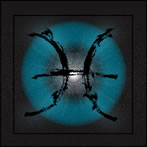 Pisces (Feb. 19-March 20) — I trust that Mars retrograde in your opposite sign Virgo has taught you about the virtues of self-reliance. On one level, it’s been a long demonstration of the meaning of relationships in your life. You’ve had one opportunity after the next to tidy up your boundaries and get clear about your commitments, and the commitments of others to you. You’ve had opportunities to get clear on your Yes and your No, and to see where you’ve made mistakes with those in the past. One quality of this transit has been learning that people will really only do what they want. They might pretend for a little while, but the only truly motivating factor comes from within. Which brings me to self-reliance. You’re the engine of your life. It’s not that others are merely coming along for the ride — though it’s time for you to fully make peace with your leadership role. Leadership in what? Chiron and Neptune in your sign suggest that you’re directly connected to a source of ideas that, for most others, is simply not available, or something they understand.
Pisces (Feb. 19-March 20) — I trust that Mars retrograde in your opposite sign Virgo has taught you about the virtues of self-reliance. On one level, it’s been a long demonstration of the meaning of relationships in your life. You’ve had one opportunity after the next to tidy up your boundaries and get clear about your commitments, and the commitments of others to you. You’ve had opportunities to get clear on your Yes and your No, and to see where you’ve made mistakes with those in the past. One quality of this transit has been learning that people will really only do what they want. They might pretend for a little while, but the only truly motivating factor comes from within. Which brings me to self-reliance. You’re the engine of your life. It’s not that others are merely coming along for the ride — though it’s time for you to fully make peace with your leadership role. Leadership in what? Chiron and Neptune in your sign suggest that you’re directly connected to a source of ideas that, for most others, is simply not available, or something they understand.



